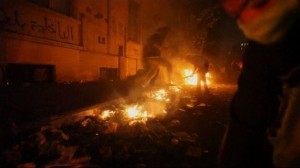
Recent renewed violence in Cairo has claimed the lives of over 30 people. Picture from BBC website.
Continuing violence that claimed the lives of about 38 people in Cairo has left the area mourning, angry and uncertain, despite an official apology from the military and a promise that parliamentary elections will actually begin to take place next week as planned. Elections under former President Mubarak were heavily influenced by his police, which denied access to the polls for many against the regime. Protestors are asking for the military to give up power now, but that is not scheduled to happen even after this election. Read analyses of Egypt’s situation, especially Egypt’s Democracy.
Our prayers continue to be with those who have suffered from violence and death, our ELCA missionaries there and all of the companions and people of the country, that wisdom and justice would overtake the fear.
Professor Mark S. Nygard, an ELCA missionary in Cairo, penned these words to his sponsors to give a feel for what it’s like there on the ground:
My taxi driver thought I should get a glimpse of it live, this
morning on my way back from Arabic class. On his own initiative he
stopped his car on the Sixth of October overhead freeway opposite the
Egyptian Museum from the square itself, and we peered between the
buildings toward the stopped cars and the crowds beyond. He said he
was going to go down there himself after work today. So did my
seminary student tutor, Amgad. Two of the international students at
the International Language Institute had been on the square the day
before, and Charlie, a Brit from Exeter, said it wasn’t pretty what he
had seen – bloodied faces and bruised bodies. Another student, Maya,
used break today to announce the request for medical aid for the
square at drop-off points around the city. Dr. Magdi, seminary vice
president, counselled us to go home during the daylight hours this
week. On my way this afternoon, I found the usually crowded parking
places on Abbasia Street empty.
So… on the one hand, we are quite conscious of the conflict and we
have stores of water, food, and money to try to be ready for any
disruption that might be necessary. On the other hand, our days
continue on under the press of our own schedules and ministries as if
nothing at all was unusual. Fall semester classes are now two-thirds
over, Aisha of Maa’di discusses connectors of direct and indirect
objects to Arabic verbs, Philip Friesen of St. Paul offers November
guest lectures on social change, I prepare for a Scholar’s Seminar
called “1960 and 2010: Missiology Then and Now,” my Dutch colleague,
Willem, offers a daring way better to manage our challenging
curriculum, and in the midst of it all, a French missionary teacher
friend needs us to babysit a kitten for five days, and this, in an
apartment where pets are forbidden. Things don’t simply shut down
because a country is struggling to determine its destiny! Our life is
full.

